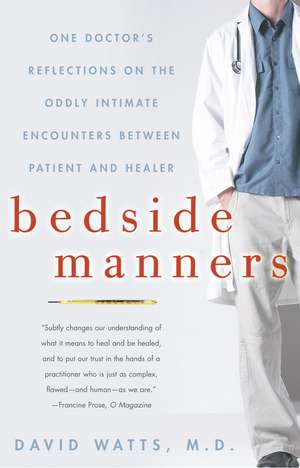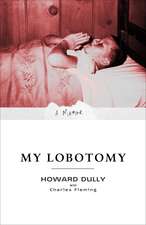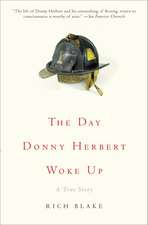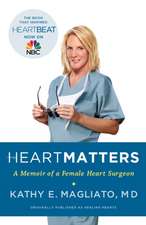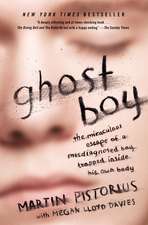Bedside Manners: One Doctor's Reflections on the Oddly Intimate Encounters Between Patient and Healer
Autor David Wattsen Limba Engleză Paperback – 31 ian 2006
Combining the grace and precision of a poet with a down-to-earth, compassionate manner, physician and NPR commentator David Watts reveals what it’s really like to be a doctor today. From difficult diagnoses, irreverent colleagues, brave survivors, and examining room embarrassments, Watts uncovers the world of contemporary medicine and shares the emotional truths and practical realities at the heart of every doctor-patient relationship.
Watts’s warmhearted and understanding attitude toward his patients—and their foibles—is evident on every page of this surprising, poignant, and intimate look inside the life of a doctor who could very easily be your own.
Preț: 106.45 lei
Nou
Puncte Express: 160
Preț estimativ în valută:
20.37€ • 21.78$ • 16.98£
20.37€ • 21.78$ • 16.98£
Carte disponibilă
Livrare economică 27 martie-10 aprilie
Preluare comenzi: 021 569.72.76
Specificații
ISBN-13: 9781400080526
ISBN-10: 1400080525
Pagini: 283
Dimensiuni: 135 x 204 x 17 mm
Greutate: 0.23 kg
Editura: Three Rivers Press (CA)
ISBN-10: 1400080525
Pagini: 283
Dimensiuni: 135 x 204 x 17 mm
Greutate: 0.23 kg
Editura: Three Rivers Press (CA)
Notă biografică
David Watts, M.D., is a poet and a regular commentator on NPR’s All Things Considered. He lives in Mill Valley, California.
Extras
White Rabbits
Frank is in my waiting room, which means I'm going to be spending a lot of time chasing rabbits—little questions he brings on small crumples of paper that skitter around on my desk, issues he's researched on the Internet and gotten emotional about that usually don't have anything to do with his own circumstance. What's worse, he's about to have an operation, which means he's really going to be worked up.
I'm remembering that he's the guy with too many colonoscopies. "Well, something might have gone wrong since the last one," he'll say. True, but mostly not true. Still, you can resist that argument only so long and then you find yourself torquing another scope through the colon.
And it's not a trivial deal. He goes vagal in the mid-transverse colon, drops his blood pressure, looks like the life force is beating it out of town on the lam. We haven't killed him yet, but we may have come pretty close. And it probably doesn't do a lot of good for his oxygen-starved brain cells that his blood turns to molasses like that. Besides, watching him go shocky sends my coronaries into spasm.
I made him sign a release before the last one. That was after the cardiologist told him no more colonoscopies until he got his carotid arteries fixed. Even the S word, stroke, couldn't deter Frank.
I'm not going to have a stroke, he said.
It struck me that he has one set of evaluators for a real disease that could do real harm and another set for the harmless imaginary one.
He wrote a long letter releasing everyone this side of Kansas from any kind of liability connected with colonoscopy. This is a man who knows what he wants even if it doesn't make sense. We did it, but not before I secretly cleared it with the cardiologist. And we survived. All three of us. But I told him no more nonsense until he got a little more blood flow to his critical body parts.
Now the time has come. 'Bout time, I say. The vascular surgeons are ready to ream out his carotids, but he wants to ask me a few questions first. I knew that. And I know what's coming—so here we go.
I understand you can get a stroke from this operation.
That's true.
How common is it?
I don't know. Not very common. It's a question you should ask the vascular surgeons.
They don't hold still as long as you do.
Tie them down and ask them. Meanwhile, they don't do the surgery unless the risk of waiting outweighs the risk of the surgery itself. It's a complicated formula and I'm sure it's only partly accurate, but that's the intent. It has to do with the extent of stenosis.
What's that?
Narrowing.
How narrow is mine?
Ninety percent, both sides.
Is it safe to say it's small?
What's small?
The risk of stroke.
It's small. Smaller than if you didn't have surgery.
How long will I be in the hospital?
Don't know. These days, probably not long.
Three days?
Thereabouts.
I read that they will put me on something to thin my platelets.
Yeah, probably.
What'll that be?
It's up to the cardiologist and the vascular surgeon.
What are the side effects?
And I'm thinking to myself, This is an example of how questions get asked for the sake of asking. Fueled by their own passion, they spring from a point beyond the platform of knowledge. How would I know the side effects if I don't know the drug?
I can't answer that.
A long silence.
The rabbits were moving from one pile to another.
Well, I have some questions about these bor . . . I can never say it.
What?
Sounds in my abdomen.
Borborygmi.
Yeah, that. I keep getting these loud noises.
You always have that.
Yeah, but I don't believe it's normal.
I know you don't believe it's normal, but you've always been normal. Every colonoscopy has been normal. We've studied you from teeth to toenails and there's nothing in there. Nothing.
What do you listen for if you think you've got cancer?
Now we've come to it, I thought. This is the root of the multitudinous colonoscopies, the driving force for the unseen locomotive: failure to believe negative data. Failure to temper the fear that something is wrong somewhere.
I am careful to speak the truth. But truth comes in many packages and it looks different to different people. For Frank I will speak it in a way that wants to bring him back to earth. Just somewhere along terra firma. It would be a mistake to lay out all the variables. That would give him too many openings to hang himself on yet another obsessive rope of worry. So I overstate.
You don't have cancer.
How can you be sure?
You don't have cancer. Since he cannot shut that door, I shut it for him.
He acts like he didn't want to hear this. He looks uneasy, fumbling with his notes as if they, by their meticulous preparations, will ride him over this unpleasant hiatus. They do not. He is forced to accept and move on.
Well, what do abnormal bowel sounds sound like?
I could be offended by that question. Layered into it is distrust of my ability, my training and experience to listen and report, as if only he, with his untrained ear, can decide what is normal. I conclude it is an accident of distraction. Of obsession. He is blinded by his worries.
I indulge him; I'm not sure why. But I can feel that I'm getting close to my limit.
Bowel sounds are abnormal if they are absent for one minute in all four quadrants of the abdomen, if they are high-pitched and occur in rushes as they do during a dynamic obstruction, or if they are amphoric, meaning that they sound cavernous, like water dripping in a very wet cave—
He interrupts: Can you be more specific?
No.
No?
No. End of lesson.
Well, I want you to hear—
I've listened to your belly a hundred times.
No, I mean—
And he brings out a little velvet pouch, something you might see holding a family heirloom, a watch perhaps, the lovingly engraved kind, made of gold and wound by a tiny gold key. He lays it on the table and starts clumsily trying to extricate whatever it is that is wedged inside.
And with a straight face he says, I made a recording of these bo . . . bo . . . bobo . . . rygeums, or whatever. I want you to listen to it.
By now he has the recording device out on the table and is fumbling with it, trying to get it to play. It's not cued to the proper place and he is madly forwarding and rewinding. I realize I am most amazed not by the weirdness it takes to record one's own bowel sounds, not by his solipsistic assumption that I will find this of such great and compelling interest as to arrest my whole practice while we await the multimedia presentation, but that I will tolerate his time-consuming fiddlings with this bowel-noise recording device of his while patients fully deserving my attention wait their turn. Were it not so humorous, it would be maddening.
Without thinking, my body has stood up and is leaving the room. I babble something polite like I have to see someone down the hall, and am gone before I can laugh or burst out with something I'd be sorry for. I am tempted to relate this story to those in the hallway, but who would believe that there's a guy in my office playing a recording of his own bowel sounds?
When I return, he's found it. He plays me ten seconds of static, mike noise, adventitial sounds. And in the background, harmless bowel mumblings.
Normal, I pronounce.
Are you sure?
Sure.
He is incredulous, but I leave him no openings. I am not in the mood for encores.
He is quiet for a moment. Then he rallies. I was reading about fistulae, he says.
Oh no.
Yeah, and how do you know if you've got a fistula?
Frank, I say. Cut it out. You've got a real problem in your carotids and you're out there trying to invent something in your gut you'd rather talk about. We've been there. Done that. Checked you out, first class. All is well in loop-de-loop land.
I have stunned him to silence. Even so, I know I've not heard the last of this. When he is away from me and my slaps in the face of the disease he believes in so furiously he almost wants it, doubts will filter in along the periphery and eventually, because they are welcome there, occupy again the pathways to the center of his being. He will build them up meticulously, like a young man smitten with a model airplane project, with the same concentration and enthusiasm of one whose grand vision is somehow tied to what he is building, all energies now turned in the same direction, recruiting evidence, plotting how to convert the heathens who refuse to see the obvious. Oh, for someone to share his vision.
It's not me, I say.
What?
Frank, go have your surgery. And blessings be upon you. For Christ's sake, just do what you need to do. You'll live longer.
He gathers up his rabbits and tucks them in his pocket. As I watch him, he looks like a man picking up chess pieces at the end of a bad game, not accepting the outcome.
Then he leans over the desk. Can we talk about this again? he says.
The Doctor with Food on His Shirt
He was a doctor with food on his shirt, she said.
You don't like to see that, I said. You don't like to see a doctor with food on his shirt.
And, she said, he put me in a room that wasn't a room but open space with a curtain around it, short as a miniskirt.
You don't like to see that, I said.
He said he didn't know what Asacol was and why I was taking it. I said it was for my disease. He said he didn't know why they gave Asacol for that disease. I said I'd been taking it for years—Hmm, he said—for my disease and I thought that everybody who had this disease took it. He said he noticed that I worked for that company that had the big scandal recently and what did I know about that scandal because he was interested in what did I know about it. And I said I'd rather talk about my disease, which was why I came, to talk about my disease.
You don't like to see that, I said. You don't like to see a doctor who doesn't want to talk about your disease.
And people were walking up and down outside my curtained-off open space, which was not a room, talking loudly about weight-loss pills and which one worked best, and how Josie's boobs really looked a lot better now that she'd got them fixed.
And he asked me a couple of questions which I don't remember but I do remember it didn't sound like he knew very much about my disease, or maybe nothing at all, because he looked at me and said you look okay, you look okay to work—just like that—and I said aren't you going to examine me and he said okay and put his hand on my belly. But I know you can't tell the color of the colon inside by putting your hand on the belly outside.
He didn't look at the disease, I said.
He didn't look at the disease, she said. He might not have known where to look.
Maybe he's a hired gun, I said.
What do you mean, hired gun?
Maybe he's a paid killer.
What do you mean, paid killer?
I said, Maybe they have paid him to kill off your disability, the disability you paid into, working all those years at that company with the scandal and the days that made your disease worse, and paying in each month to social security and state disability, that money you paid, in case you needed it later and now you need it and they want him to kill it off.
But isn't the system supposed to take care of you? she said. That's what they said when they withheld all that money: The system will care for you when you need it.
I said, It's cheaper for the system to pay a doctor who will file a report to kill off the disability I put you on, and that you deserve because your colitis will not stay under control as long as you work for that company, cheaper than it is to pay your disability. It's economics.
She said she could see that and it sure felt that way but she didn't understand the part about how a doctor could train under that oath to do—what is it?—do no harm? And then go around killing off her disability like that.
I said, Let me tell you a story. Suppose you're a doctor whose practice is not going well and all the patients seem to be going down the street to the doctor who doesn't have any food on his shirt. And every patient who sees him is one patient fewer who sees you and you're looking around for some way to pay the overhead and buy a biscuit for breakfast and the disability company sends you a patient with ulcerative colitis who can't work anymore and you look at her and say, She looks like she can work, and they pay you for that. Pay you pretty well. For that. And you keep your office and your buscuit and maybe you know the principle or maybe you don't know the principle, that if you say no to the disability company they won't be as inclined to send you any more patients, but as long as you keep saying "back to work" and things like that, they will keep you busy.
And she said, Oh.
And then she asked, What did he say in his letter?
And I read her the part about how she looked okay and he didn't see why she couldn't do some work of some kind.
And she didn't say anything.
And I said, You could make an appeal, and she said, That's the kind of stress that makes my disease worse and that I'm trying to avoid by all this, and I said, I understand, and she said, I'll be okay. But I sure could have used some of that money.
I said I was sorry and then something about how you don't like to see things turn out this way and she said, Thanks, and we sat for a while not saying anything.
And then she said, You know, I found out he's not a gastroenterologist. He's a weight-loss doctor.
And I said, Was he fat?
And she said, Yes, he was.
And what kind of food was it, anyway?
And she said, I'm not sure. It might have been tomato. Pizza sauce or something.
And I said, You don't like to see that. You don't like to see a doctor with food on his shirt.
From the Hardcover edition.
Frank is in my waiting room, which means I'm going to be spending a lot of time chasing rabbits—little questions he brings on small crumples of paper that skitter around on my desk, issues he's researched on the Internet and gotten emotional about that usually don't have anything to do with his own circumstance. What's worse, he's about to have an operation, which means he's really going to be worked up.
I'm remembering that he's the guy with too many colonoscopies. "Well, something might have gone wrong since the last one," he'll say. True, but mostly not true. Still, you can resist that argument only so long and then you find yourself torquing another scope through the colon.
And it's not a trivial deal. He goes vagal in the mid-transverse colon, drops his blood pressure, looks like the life force is beating it out of town on the lam. We haven't killed him yet, but we may have come pretty close. And it probably doesn't do a lot of good for his oxygen-starved brain cells that his blood turns to molasses like that. Besides, watching him go shocky sends my coronaries into spasm.
I made him sign a release before the last one. That was after the cardiologist told him no more colonoscopies until he got his carotid arteries fixed. Even the S word, stroke, couldn't deter Frank.
I'm not going to have a stroke, he said.
It struck me that he has one set of evaluators for a real disease that could do real harm and another set for the harmless imaginary one.
He wrote a long letter releasing everyone this side of Kansas from any kind of liability connected with colonoscopy. This is a man who knows what he wants even if it doesn't make sense. We did it, but not before I secretly cleared it with the cardiologist. And we survived. All three of us. But I told him no more nonsense until he got a little more blood flow to his critical body parts.
Now the time has come. 'Bout time, I say. The vascular surgeons are ready to ream out his carotids, but he wants to ask me a few questions first. I knew that. And I know what's coming—so here we go.
I understand you can get a stroke from this operation.
That's true.
How common is it?
I don't know. Not very common. It's a question you should ask the vascular surgeons.
They don't hold still as long as you do.
Tie them down and ask them. Meanwhile, they don't do the surgery unless the risk of waiting outweighs the risk of the surgery itself. It's a complicated formula and I'm sure it's only partly accurate, but that's the intent. It has to do with the extent of stenosis.
What's that?
Narrowing.
How narrow is mine?
Ninety percent, both sides.
Is it safe to say it's small?
What's small?
The risk of stroke.
It's small. Smaller than if you didn't have surgery.
How long will I be in the hospital?
Don't know. These days, probably not long.
Three days?
Thereabouts.
I read that they will put me on something to thin my platelets.
Yeah, probably.
What'll that be?
It's up to the cardiologist and the vascular surgeon.
What are the side effects?
And I'm thinking to myself, This is an example of how questions get asked for the sake of asking. Fueled by their own passion, they spring from a point beyond the platform of knowledge. How would I know the side effects if I don't know the drug?
I can't answer that.
A long silence.
The rabbits were moving from one pile to another.
Well, I have some questions about these bor . . . I can never say it.
What?
Sounds in my abdomen.
Borborygmi.
Yeah, that. I keep getting these loud noises.
You always have that.
Yeah, but I don't believe it's normal.
I know you don't believe it's normal, but you've always been normal. Every colonoscopy has been normal. We've studied you from teeth to toenails and there's nothing in there. Nothing.
What do you listen for if you think you've got cancer?
Now we've come to it, I thought. This is the root of the multitudinous colonoscopies, the driving force for the unseen locomotive: failure to believe negative data. Failure to temper the fear that something is wrong somewhere.
I am careful to speak the truth. But truth comes in many packages and it looks different to different people. For Frank I will speak it in a way that wants to bring him back to earth. Just somewhere along terra firma. It would be a mistake to lay out all the variables. That would give him too many openings to hang himself on yet another obsessive rope of worry. So I overstate.
You don't have cancer.
How can you be sure?
You don't have cancer. Since he cannot shut that door, I shut it for him.
He acts like he didn't want to hear this. He looks uneasy, fumbling with his notes as if they, by their meticulous preparations, will ride him over this unpleasant hiatus. They do not. He is forced to accept and move on.
Well, what do abnormal bowel sounds sound like?
I could be offended by that question. Layered into it is distrust of my ability, my training and experience to listen and report, as if only he, with his untrained ear, can decide what is normal. I conclude it is an accident of distraction. Of obsession. He is blinded by his worries.
I indulge him; I'm not sure why. But I can feel that I'm getting close to my limit.
Bowel sounds are abnormal if they are absent for one minute in all four quadrants of the abdomen, if they are high-pitched and occur in rushes as they do during a dynamic obstruction, or if they are amphoric, meaning that they sound cavernous, like water dripping in a very wet cave—
He interrupts: Can you be more specific?
No.
No?
No. End of lesson.
Well, I want you to hear—
I've listened to your belly a hundred times.
No, I mean—
And he brings out a little velvet pouch, something you might see holding a family heirloom, a watch perhaps, the lovingly engraved kind, made of gold and wound by a tiny gold key. He lays it on the table and starts clumsily trying to extricate whatever it is that is wedged inside.
And with a straight face he says, I made a recording of these bo . . . bo . . . bobo . . . rygeums, or whatever. I want you to listen to it.
By now he has the recording device out on the table and is fumbling with it, trying to get it to play. It's not cued to the proper place and he is madly forwarding and rewinding. I realize I am most amazed not by the weirdness it takes to record one's own bowel sounds, not by his solipsistic assumption that I will find this of such great and compelling interest as to arrest my whole practice while we await the multimedia presentation, but that I will tolerate his time-consuming fiddlings with this bowel-noise recording device of his while patients fully deserving my attention wait their turn. Were it not so humorous, it would be maddening.
Without thinking, my body has stood up and is leaving the room. I babble something polite like I have to see someone down the hall, and am gone before I can laugh or burst out with something I'd be sorry for. I am tempted to relate this story to those in the hallway, but who would believe that there's a guy in my office playing a recording of his own bowel sounds?
When I return, he's found it. He plays me ten seconds of static, mike noise, adventitial sounds. And in the background, harmless bowel mumblings.
Normal, I pronounce.
Are you sure?
Sure.
He is incredulous, but I leave him no openings. I am not in the mood for encores.
He is quiet for a moment. Then he rallies. I was reading about fistulae, he says.
Oh no.
Yeah, and how do you know if you've got a fistula?
Frank, I say. Cut it out. You've got a real problem in your carotids and you're out there trying to invent something in your gut you'd rather talk about. We've been there. Done that. Checked you out, first class. All is well in loop-de-loop land.
I have stunned him to silence. Even so, I know I've not heard the last of this. When he is away from me and my slaps in the face of the disease he believes in so furiously he almost wants it, doubts will filter in along the periphery and eventually, because they are welcome there, occupy again the pathways to the center of his being. He will build them up meticulously, like a young man smitten with a model airplane project, with the same concentration and enthusiasm of one whose grand vision is somehow tied to what he is building, all energies now turned in the same direction, recruiting evidence, plotting how to convert the heathens who refuse to see the obvious. Oh, for someone to share his vision.
It's not me, I say.
What?
Frank, go have your surgery. And blessings be upon you. For Christ's sake, just do what you need to do. You'll live longer.
He gathers up his rabbits and tucks them in his pocket. As I watch him, he looks like a man picking up chess pieces at the end of a bad game, not accepting the outcome.
Then he leans over the desk. Can we talk about this again? he says.
The Doctor with Food on His Shirt
He was a doctor with food on his shirt, she said.
You don't like to see that, I said. You don't like to see a doctor with food on his shirt.
And, she said, he put me in a room that wasn't a room but open space with a curtain around it, short as a miniskirt.
You don't like to see that, I said.
He said he didn't know what Asacol was and why I was taking it. I said it was for my disease. He said he didn't know why they gave Asacol for that disease. I said I'd been taking it for years—Hmm, he said—for my disease and I thought that everybody who had this disease took it. He said he noticed that I worked for that company that had the big scandal recently and what did I know about that scandal because he was interested in what did I know about it. And I said I'd rather talk about my disease, which was why I came, to talk about my disease.
You don't like to see that, I said. You don't like to see a doctor who doesn't want to talk about your disease.
And people were walking up and down outside my curtained-off open space, which was not a room, talking loudly about weight-loss pills and which one worked best, and how Josie's boobs really looked a lot better now that she'd got them fixed.
And he asked me a couple of questions which I don't remember but I do remember it didn't sound like he knew very much about my disease, or maybe nothing at all, because he looked at me and said you look okay, you look okay to work—just like that—and I said aren't you going to examine me and he said okay and put his hand on my belly. But I know you can't tell the color of the colon inside by putting your hand on the belly outside.
He didn't look at the disease, I said.
He didn't look at the disease, she said. He might not have known where to look.
Maybe he's a hired gun, I said.
What do you mean, hired gun?
Maybe he's a paid killer.
What do you mean, paid killer?
I said, Maybe they have paid him to kill off your disability, the disability you paid into, working all those years at that company with the scandal and the days that made your disease worse, and paying in each month to social security and state disability, that money you paid, in case you needed it later and now you need it and they want him to kill it off.
But isn't the system supposed to take care of you? she said. That's what they said when they withheld all that money: The system will care for you when you need it.
I said, It's cheaper for the system to pay a doctor who will file a report to kill off the disability I put you on, and that you deserve because your colitis will not stay under control as long as you work for that company, cheaper than it is to pay your disability. It's economics.
She said she could see that and it sure felt that way but she didn't understand the part about how a doctor could train under that oath to do—what is it?—do no harm? And then go around killing off her disability like that.
I said, Let me tell you a story. Suppose you're a doctor whose practice is not going well and all the patients seem to be going down the street to the doctor who doesn't have any food on his shirt. And every patient who sees him is one patient fewer who sees you and you're looking around for some way to pay the overhead and buy a biscuit for breakfast and the disability company sends you a patient with ulcerative colitis who can't work anymore and you look at her and say, She looks like she can work, and they pay you for that. Pay you pretty well. For that. And you keep your office and your buscuit and maybe you know the principle or maybe you don't know the principle, that if you say no to the disability company they won't be as inclined to send you any more patients, but as long as you keep saying "back to work" and things like that, they will keep you busy.
And she said, Oh.
And then she asked, What did he say in his letter?
And I read her the part about how she looked okay and he didn't see why she couldn't do some work of some kind.
And she didn't say anything.
And I said, You could make an appeal, and she said, That's the kind of stress that makes my disease worse and that I'm trying to avoid by all this, and I said, I understand, and she said, I'll be okay. But I sure could have used some of that money.
I said I was sorry and then something about how you don't like to see things turn out this way and she said, Thanks, and we sat for a while not saying anything.
And then she said, You know, I found out he's not a gastroenterologist. He's a weight-loss doctor.
And I said, Was he fat?
And she said, Yes, he was.
And what kind of food was it, anyway?
And she said, I'm not sure. It might have been tomato. Pizza sauce or something.
And I said, You don't like to see that. You don't like to see a doctor with food on his shirt.
From the Hardcover edition.
Recenzii
“David Watts is a gifted storyteller with a sense of the poetic, macabre, ironic, and surreal. He combines eloquence, erudition, and an ear for the gritty vernacular of the examining room and ER—a thoroughly satisfying read.”—Leonard Shlain, author of The Alphabet Versus the Goddess and Sex, Time and Power
“Watts can compress humor, pathos, and bewitching ambiguity into a few pages. Acting like a doctor, as he counsels himself, carries the risk of arrogance. Being a doctor demands a profound and grateful openness to the unknown.” —Steven Winn, arts and culture critic, San Francisco Chronicle
“These encounters with his patients by a wise, kind doctor are finely wrought in language that is always clear and compassionate. They are a welcome addition to the growing body of literature from the experience of medicine.” —Richard Selzer, surgeon and author of The Whistler’s Room
“Even the most routine checkup will never be quite the same. Watts’s sympathy for both physicians and their patients subtly changes our understanding of what it means to heal and be healed, and to put our trust in the hands of a practitioner who is just as complex, flawed—and human—as we are.” —Francine Prose, O, The Oprah Magazine
“Always sensitive, sometimes hilarious.” —San Francisco Chronicle
“Candid, poetic prose . . . You’ll wish your doctor were half as attentive.” —Newsweek
“Watts can compress humor, pathos, and bewitching ambiguity into a few pages. Acting like a doctor, as he counsels himself, carries the risk of arrogance. Being a doctor demands a profound and grateful openness to the unknown.” —Steven Winn, arts and culture critic, San Francisco Chronicle
“These encounters with his patients by a wise, kind doctor are finely wrought in language that is always clear and compassionate. They are a welcome addition to the growing body of literature from the experience of medicine.” —Richard Selzer, surgeon and author of The Whistler’s Room
“Even the most routine checkup will never be quite the same. Watts’s sympathy for both physicians and their patients subtly changes our understanding of what it means to heal and be healed, and to put our trust in the hands of a practitioner who is just as complex, flawed—and human—as we are.” —Francine Prose, O, The Oprah Magazine
“Always sensitive, sometimes hilarious.” —San Francisco Chronicle
“Candid, poetic prose . . . You’ll wish your doctor were half as attentive.” —Newsweek
